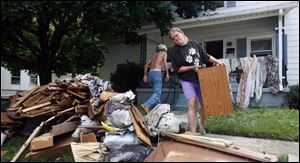
Experts map flood cleanup precautions
8/25/2007
Angela Lowe and her father, Henry Lowe, remove debris from their home on High Street in Findlay. Officials said mold, mosquitoes, and tainted water are among the post-flood dangers.
More residents of Findlay, Carey, and other flooded northwestern Ohio communities are returning to their homes to deal with the remaining ravages of water - and they need to take precautions to protect their health and safety, officials say.
Armed with gloves, masks, disinfectants, and other supplies, Lorri and Steed Dilgard of Findlay were able to enter their house on Findlay's East Main Cross Street for the first time yesterday.
This is the fifth - and worst - time the two-story house with three boats attached to the front porch yesterday has been hit by flooding since December, when the Dilgards' younger daughter was sickened by two parasites typically associated with contaminated water.
The flooding veterans are drinking only bottled water and taking other health precautions as they attempt to clean up and try to figure out what can be salvaged from their home.
Because at least 18 inches of water got into the first floor this time, buckling wood floors and causing other damage, their home of 16 years may be assessed as a loss, Mrs. Dilgard said.
"It's just amazing," she said of flooding in the city.
"What saddens me is there's so many [houses] now that are damaged that never got damaged before," she said.
People encountering floodwater and debris as they start cleaning up the damage may need tetanus shots, health officials said yesterday. Also, they said, water with fecal matter or other contaminants could have entered wells, and risks of dehydration and gastrointestinal problems loom.
And mold could crop up in water-damaged houses and other buildings, with the possibility of mosquitoes not far behind despite efforts to quell them, health officials said.
It takes about two weeks for fresh mosquito eggs to hatch from the standing water the pesky insects love.
Mold may not become an issue if residents are able to quickly and properly dry out items and their houses, said Jeff Ritchey, environmental health director for the Wyandot County health department.
"The hope is that people do a good job of cleaning up as soon as possible so we don't get a lot of mold in these buildings," he said.
Mold could cause respiratory problems, especially for those with asthma and other breathing problems, said Colleen Abrams, infection control coordinator for the Blanchard Valley Health System in Findlay.
While working, residents need to make sure they wash their hands with soap and water so they don't unintentionally ingest contaminants, keep hydrated to combat heat, and take frequent breaks to avoid fatigue, Ms. Abrams said.
In Putnam County, which held a tetanus-shot clinic yesterday and expects to do more, health officials are helping test water supplies and instructing residents how to clean wells that could have been contaminated by flooding, said Ruth Gerding, emergency response coordinator for the Putnam County health department.
Contact Julie M. McKinnon at:
jmckinnon@theblade.com
or 419-724-6087.